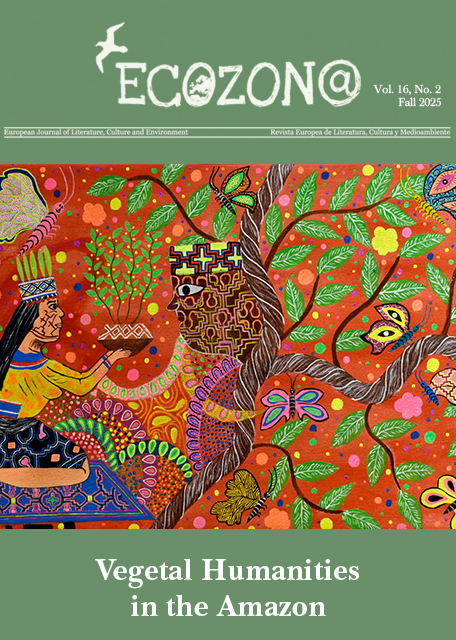Where the Ground Answers the Foot: Kerstin Ekman, Ecology, and the Sense of Place in a Globalized World
DOI:
https://doi.org/10.37536/ECOZONA.2010.1.2.359Parole chiave:
Kerstin Ekman, Händelser vid vatten, space and place, ecologyAbstract
Kerstin Ekman has emerged as one of the important literary voices in Northern Europe challenging facile definitions of nature and inviting readers to reconsider conceptions of the local. She accomplishes this by using ecological models in her fiction that explore how human subjects exist in interdependent relationships with their environments intertwining space with experience and memory to produce constellations of significance and meaning. The materiality of the space combines with human discourse to create a sense of place situated between immediate and the distant and between the constructed and the found.
In particular, her 1993 work, Händelser vid vatten [Blackwater] explores an ecological model of ontology in which all elements are intricately interconnected in myriad ways that question, among other things, the construction of place and the role of both materiality and place in an increasingly mobile, technologically mediated, and globalized world. My purpose is to consider Ekman's model(s) of ecological interdependence in dialogue with the theoretical discussions of space and place that have emerged in recent decades, particularly within the field of ecocriticism. In Ekman's work, the decidedly human propensities for naming, narrating, manipulating, and constructing space are counterbalanced by an experience of materiality and the natural environment's ultimate ambivalence to anthropocentrism. The novel's network of competing narratives, memories, definitions, and confrontation with materiality tend to frustrate the classical modernist epistemological project by lacking clear linearity, diverging, converging, and doubling back on themselves. The effect is to focus readers' attention on how space is produced as a means of understanding the diffuse subject's being in the world as part of complex material and discursive networks as well as between the constructed and the found, the subjective and the objective, the embodied and the abstract, and the local and the global.
Resumen
Kerstin Ekman se ha revelado como una de las voces importantes en el norte de Europa por que ha desafiado las definiciones de naturaleza e invitado a los lectores a reconsiderar las nociones de lo local. Ekman emplea modelos ecológicos en su ficción para explorar cómo los sujetos humanos participan en relaciones interdependientes con su entorno, donde el espacio se entrelaza con la experiencia y la memoria para producir redes de importancia y significado. La materialidad de la geografía se combina con el discurso humano para crear un sentido del lugar entre lo inmediato y lo remoto, entre lo construido y lo encontrado.
En particular, su obra de 1993, Händelser vid vatten [Ocurrió a orillas del río], explora un modelo ecológico de ontología en el que todos los elementos se encuentran complejamente interconectados y se combinan para cuestionar tanto el papel de la materialidad el del lugar en un mundo globalizado cada vez más móvil, tecnológicamente mediado . Este ensayo considera cómo Ekman representa la interdependencia ecológica en diálogo con los debates teóricos más recientes sobre el espacio y el lugar, especialmente dentro del campo de la ecocrítica. En la obra de Ekman, la tendencia indudablemente humana por nombrar, narrar, manipular, y construir el espacio se contrarresta con la experiencia de la materialidad y el descubrimiento de la indiferencia de la naturaleza hacia el interés humano. En la novela, la red de narraciones y memorias que compiten frustra un proyecto epistemológico estable ya que carece de una linealidad clara cuando éstas se enfrentan a una materialidad geográfica persistente. El efecto es centrar la atención del lector en cómo el espacio y el lugar se presentan como parte de la existencia en el mundo de un sujeto impreciso. El lugar, para Ekman, surge entre lo construido y lo encontrado, lo subjetivo y lo objetivo, lo incorporado y lo abstracto, y lo local y lo global.
Downloads
##submission.downloads##
Pubblicato
Fascicolo
Sezione
Licenza
Authors who publish with this journal agree to the following terms:
a) Authors retain copyright and grant the journal right of first publication with the work simultaneously licensed under a Creative Commons Attribution License that allows others to share the work with an acknowledgement of the work's authorship and initial publication in this journal (CC BY-NC for articles and CC BY-NC-ND for creative work, unless author requests otherwise.
b) Authors are able to enter into separate, additional contractual arrangements for the non-exclusive distribution of the journal's published version of the work (e.g., post it to an institutional repository or publish it in a book), with an acknowledgement of its initial publication in this journal.
c) Authors are permitted and encouraged to post their work online (e.g., in institutional repositories or on their website) prior to and during the submission process, as it can lead to productive exchanges, as well as earlier and greater citation of published work (See The Effect of Open Access).










